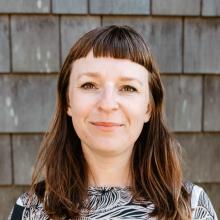How the Puget Sound region grows and changes matters for the climate—and for all of us. By 2050, the region’s population will exceed 5.8 million people. When we reach that milestone, do we want the place we live to include walkable neighborhoods, ample transit, and healthy natural systems? Will we be responding effectively to the climate crisis, creating far less carbon pollution? Will we be able to ensure that everyone, regardless of their ethnicity, their gender, their cultural or economic background, is able to thrive? If you care about the answers to those questions today, then you should care about the Puget Sound Regional Council’s long-term growth plan, called Vision 2050.
The Puget Sound Regional Council (PSRC) coordinates decisions around regional growth, transportation, and economic development for the four counties making up the Puget Sound region. Where people here live and work, and how we get around, matter for the health of our climate; transportation accounts for more than one third of regional greenhouse gas emissions. Right now, PSRC is drafting a long-range growth plan, Vision 2050, which will help determine where and how the region will grow. Because city-based and other local growth plans will be evaluated according to PSRC’s Regional Growth Strategy, and because PSRC is responsible for distributing transportation project funding, the goals, policies, and actions embedded in Vision 2050 really matter.
If we as a region are going to responsibly address the climate crisis, Vision 2050 must do so as well. For the first time, PSRC is now incorporating a climate change chapter into its plan, but in order to meet our scientific and moral imperative to limit global heating, we need bold policies. The current draft of Vision 2050 is a start, but it needs to go much further. Climate Solutions, along with a host of other organizations gathered together by Transportation Choices Coalition, have been pushing PSRC to better incorporate effective climate justice principles into Vision 2050. Here is what we would like to see:
Climate pollution reduction targets that align with the latest science. PSRC should formally adopt specific targets to reduce emissions. Right now, Vision 2050 references a variety of targets set by different jurisdictions and levels of government, some of which are inadequate. We believe PSRC at a minimum should align with and adopt the same emissions reductions targets as the Puget Sound Clean Air Agency. A goal of “substantially reducing greenhouse gas emissions” is simply too nebulous.
Decision making through a climate justice lens. Since PSRC approves local growth plans and allocates transportation funding, it should make sure projects and plans equitably reduce emissions in a way that supports adopted emissions reductions targets when it is making these decisions. In other words, these targets need to shape decisions and shouldn’t be merely aspirational numbers on a page. PSRC should also provide local governments with tools and policies to help them take climate action in areas within their authority.
Evaluating whether we’re on the right track. We’re facing a climate crisis, and what we do well before 2050, indeed, within the next decade, will determine whether or not we bake! Therefore, PSRC should adopt an iterative process to determine whether its policies are leading to reduced emissions (based on set goals) and make adjustments when necessary. Currently, this is slated to happen in some form every four years under its Four-Part Greenhouse Gas Strategy, but given the limited time we have to curb emissions, this evaluation needs to be expedited. We would like to see interim reviews more frequently so we can course correct as necessary.
Protecting vulnerable communities. PSRC’s forthcoming Regional Equity Strategy should inform its Greenhouse Gas Strategy to ensure those who are disproportionately harmed by climate change will be centered in mitigation and adaptation strategies. As a part of this, PSRC should suggest a set of policies that local governments can employ to promote climate justice. For example, we would like to see specific examples of how municipalities can limit displacement, which has very real human and climate impacts, as our region grows. PSRC can be a real resource for its member jurisdictions in this way.
When it comes to protecting our region, our communities, and our planet, long-range planning matters. If you’d like our region to be healthy, vibrant, equitable, and sustainable, you can share your thoughts about Vision 2050 with PSRC! Feel free to use the talking points above.
Public comment on Vision 2050 is due September 16 at 5pm. You can share your thoughts here. There will also be an opportunity to comment in person at a public hearing on September 5 at 10am at PSRC’s offices in downtown Seattle.
As a region, we need to commit to climate pollution reduction goals and evaluate decisions through the lens of whether actions will help us or prevent us from meeting those goals, as well as whether these actions are equitable and just. Help us let PSRC know that we care about our region and want Vision 2050 to map out a true, actionable sustainable path forward!





